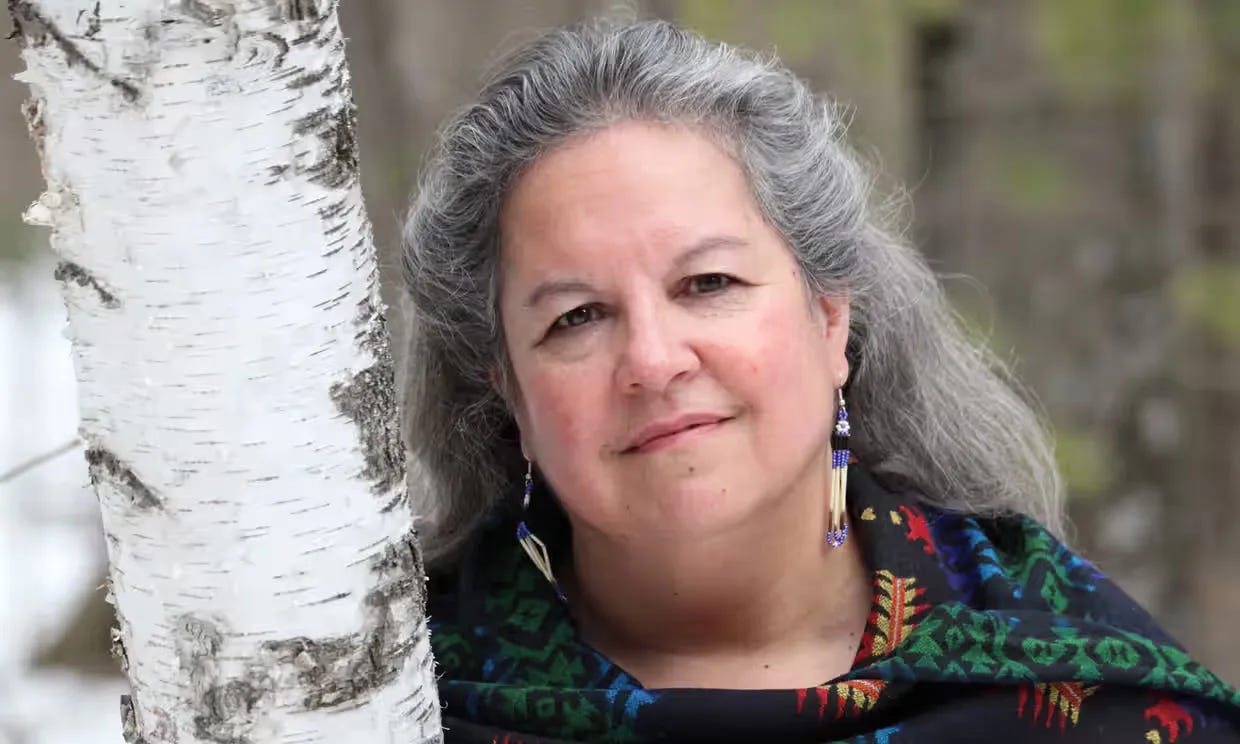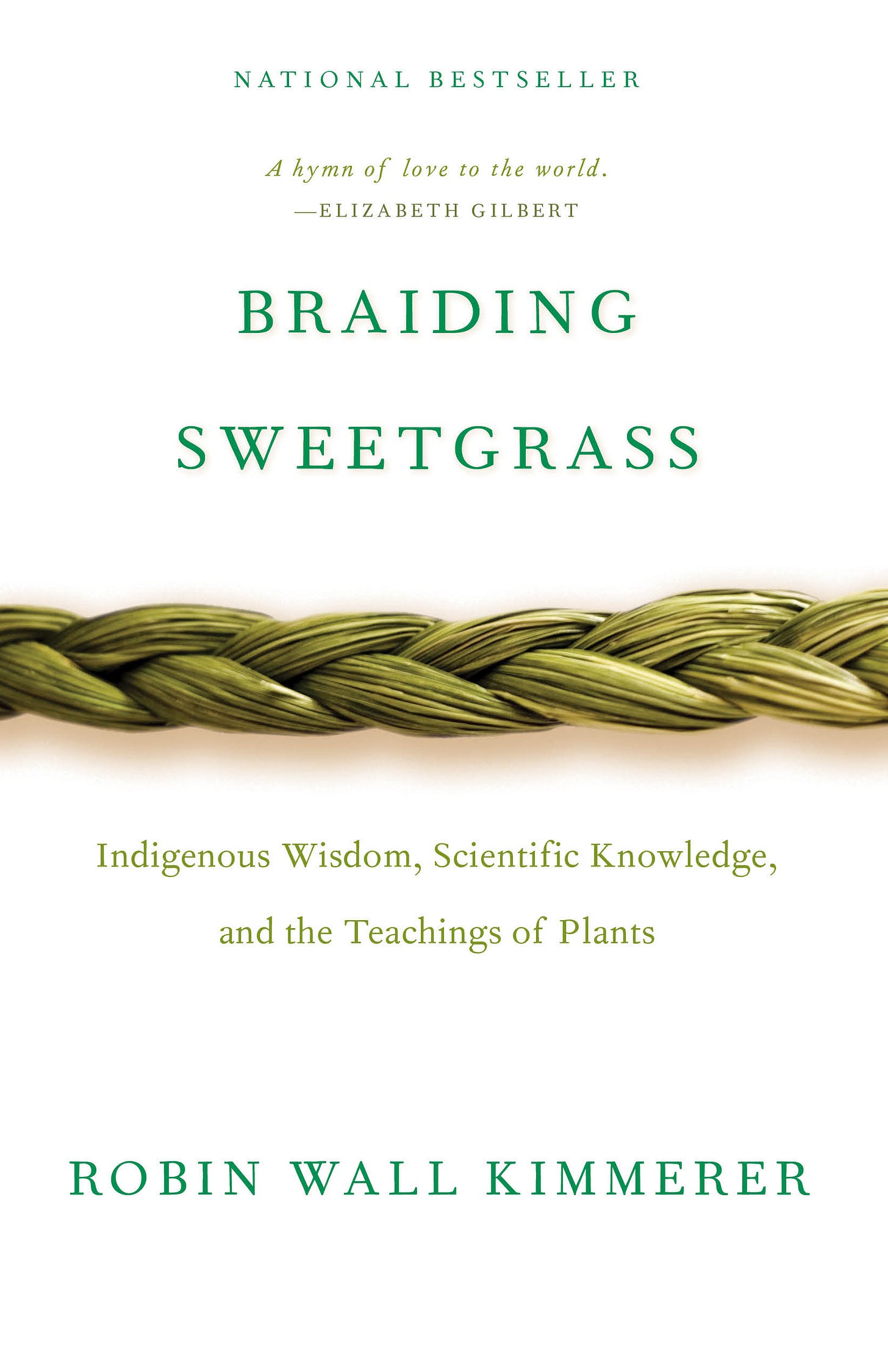Raise a Garden. Raise Good Kids. Raise a Ruckus.
Three lessons from a weekend with "Braiding Sweetgrass" author, Robin Wall Kimmerer. “Saying ‘I have enough’ is a radical act in a consumptive society.”
Please “like” this post via the heart below and restack it on Notes if you get something out of it. It’s the best way to help others find our work.
For just $5 a month (the price of a coffee!) you can upgrade to paid and get all our paid content, support independent feminist writing, AND be part of something that Joe Rogan would hate. Win!
Before we dive into today’s essay, I wanted to highlight some of the responses we got from readers in response to Sunday’s links round-up, in which I highlighted a New York Times piece about new research on ADHD. (Paid subscribers can read the comments here).
Several readers flagged concerns about the NYT article, citing critiques and fact-checks of the reporting in the story. Here’s a link to one piece that a reader thought complicated the NYT piece in an important way. We’re so grateful to our readers who care deeply about these issues, and for their kind and really thoughtful responses! MR readers keeping the internet kinder and smarter—you all are the actual best.

It’s spring—the trees are leafing, we can feel the sun on our skin again, and there are so many things to look forward to. Doesn’t it feel restorative, in spite of everything?
In honor of Earth Day, and spring, and just because we all need a little reset from the daily chaos, I’m revisiting this weekend that I spent with Robin Wall Kimmerer, a scientist, writer, mother and member of the Citizen Potawatomi Nation.
Her book of essays, Braiding Sweetgrass is a treasure that weaves together basic botany, Indigenous wisdom, and personal reflections on motherhood, political action and the climate crisis. (And she’s got a YA version too!)
It never fails to bring me solace and help me reclaim solid ground, and remind me to see beauty in the every day.
I heard Kimmerer speak at a weekend workshop last summer, and came away with these lessons for surviving — and thriving — in today’s chaos. (I’ve edited this a bit. The full essay is here for paid subscribers).
Lesson one: Raise a garden
I do not have a garden. I have house plants that I have not yet killed. But Kimmerer started the weekend by making us walk outside and get to know the land around us.
Of course, when I slow down enough to actually look at the plants around me, I remember to feel grateful for them. Gratitude is the knock-on effect of paying attention to the world.
“The practice of gratitude,” Kimmerer said, “leads to a practice of self-restraint. A feeling of ‘enoughness’ is an antidote to a desire for consuming more,” she told us.
“Saying, ‘I have enough’ is a radical act in a consumptive society.”
To be sure, I know that too many people don’t have enough. Sometimes, paying attention to the world doesn’t lead to gratitude: it leads to panic. Right now, it can feel like more bad news comes at us every day.
So what’s the point of contemplating plants, when the crises abound?
Paying attention to the plants and the trees doesn’t mean burying our heads from the troubles we face.
“I choose joy over despair,” Kimmerer said. “Not because I have my head in the sand, but because joy is what the Earth gives me daily, and I must return the favor.
We must pick up the things that we love too much to lose.”
Lesson Two: Raise Good Kids
Kimmerer’s work is rooted in her Potawatomi heritage and she is slowly teaching herself the Native language that her people lost. (Her grandfather was among the hundreds of thousands of Native children who were separated from their families and sent to Indian boarding schools, where children were forbidden to speak their native languages, and abuse was rampant.)
Along with reclaiming language, Kimmerer also believes deeply in reclaiming the Honorable Harvest, a practice of asking permission so that we do less harm, and show more respect.
“Whether we are digging wild leeks, or going to the mall, how do we consume in such a way that does justice to the lives we take?” she asks in Braiding Sweetgrass.
Here is guidance of the Honorable Harvest, which we can use right now while raising our kids (our own, and others):
Never take the first one
Ask permission
Listen for the answer
Share what you’ve taken
Take only what you need
Use everything you take
Minimize harm
Be grateful
“If you’re visiting your sweet grandma and she offers you homemade cookies on her favorite china plate, you know what to do,” Kimmerer writes. “You accept them with many ‘thank you’s’ and cherish the relationship reinforced by cinnamon and sugar.”
“But we have been rifling through the cabinets of Mother Earth without asking permission,” she told us.
The guidance of the Honorable Harvest is a critical redirect.
“It is not your birthright to take whatever you want,” Kimmerer said.
Also: Reclaim their attention!
We live in a world of diminished attention. Our challenge as parents, she told us, is to help our kids get to know “another being well enough that you know its name.”
“In order to be a good ancestor,” she said, “We don’t need to leave our kids a pile of money. We need to leave them a living planet.”
Lesson three: Raise a Ruckus
At one point in our weekend, Kimmerer wondered aloud about whether she was just “preaching to the choir:” talking about gratitude and environmental consciousness, restoration and resilience, to a crowd of largely gray-haired women with vegan-leather shoes, refillable water bottles, and Earthjustice tote bags.
But then she reframed it:
“This is the work of the choir,” she declared: to raise our collective voice.
She implored us to look out for the change that was happening for the better.
When Kimmerer was starting out in college and eager to major in botany, her professors were skeptical of her: a young Native American woman who was as interested as much in the beauty in plants as she was in the study of plants.
But she had learned from the elders in her community what it meant to be a truly educated person: “An educated person knows their own gifts, and how to give them to the world,” she said.
Gifts and responsibilities are two sides of the same coin, she told us.
So to raise a ruckus, she said, we should ask: What are our gifts?
Asking, ‘What is my gift?’ is the same thing as asking, ‘What is my responsibility?’
Throughout the weekend, Kimmerer returned to the same question: What does the Earth ask of us?
The answer, she said, was to live in such a way that the Earth will be grateful to us.
This is a post is free for all to read. If you’re loving MR, give us a like and leave a comment so new readers can find us!
Upgrade to a paid subscription to support our independent journalism and writing that helps keep us sane(ish) in these times. Paid subscriptions get access to all paid posts, chats, and book club. Join us for the price of a coffee!
And don’t forget — paid subscribers can still join Lane for the MR Book Club on Sunday April 27th at 1 pm PT and 4 pm ET. If you don’t have time to finish the book, listen to this great interview with Kendall that covers much of the material, and pop in to join us.
We are reading Hood Feminism by Mikki Kendall. It’s all about intersectionality and creating solidarity between women from different communities. (Bonus: We will be joining the fabulous feminist writer Celeste Davis for this discussion!)
Paid readers will have full access to book club. All you have to do is grab a copy and watch for the Zoom link.
Past MR book discussions have been SO GOOD and delightfully fun and nerdy—see posts here and here to get a taste.
About “Hood Feminism” by Mikki Kendall
Today’s feminist movement has a glaring blind spot, and paradoxically, it is women. Mainstream feminists rarely talk about meeting basic needs as a feminist issue, argues Mikki Kendall, but food insecurity, access to quality education, safe neighborhoods, a living wage, and medical care are all feminist issues. All too often, however, the focus is not on basic survival for the many, but on increasing privilege for the few. That feminists refuse to prioritize these issues has only exacerbated the age-old problem of both internecine discord and women who rebuff at carrying the title. Moreover, prominent white feminists broadly suffer from their own myopia with regard to how things like race, class, sexual orientation, and ability intersect with gender. “How can we stand in solidarity as a movement?” Kendall asks. -Penguin/Random House






Thanks for reading! Attention is the highest form of gratitude, someone once said!
"when I slow down enough to actually look at the plants around me, I remember to feel grateful for them. Gratitude is the knock-on effect of paying attention to the world."
Wow, I loved this.
And this part too: “The practice of gratitude,” Kimmerer said, “leads to a practice of self-restraint. A feeling of ‘enoughness’ is an antidote to a desire for consuming more,” she told us.
“Saying, ‘I have enough’ is a radical act in a consumptive society.”